As the skies above Iran glow from the fires of US and Israeli aerial bombardments, experts warn that Tehran’s embattled leaders could lash out with a drastic misstep.
Israel’s blistering air campaign against Iran’s underground nuclear facilities, missile silos, and command posts, was already shaking the foundations of Supreme Leader Ali Khamenei’s government and pushing his regime toward collapse.
The American strikes Saturday against the Iranian nuclear facilities at Fordow, Natanz and Isfahan have significantly ratcheted up tensions.
Khamenei, 86, has lost some 15-20 members of his inner circle under Israeli strikes. Scared, ill-advised, and under mounting pressure, he could make a bitter misstep at the demise of the Islamic Republic, says Middle East expert Jonathan Cristol.
‘The ayatollahs and ideologues whose mismanagement and malevolence have brought Iran to the brink of disaster now face a world of bad options, but they’re not out of options,’ Cristol, a Yeshiva University professor, told the Daily Mail.
The US and Israel can now strike anywhere in Iran with drones and advanced F-35 fighter jets, Mossad assassinations, and cyberattacks.
Iran appears unable to effectively fight back. It’s drones and ballistic missiles, through deadly, are mostly intercepted. It’s proxies Hezbollah and Hamas have been decimated; neighbor Syria is no longer an ally.
The country faces a crisis unlike anything since the 1979 Islamic Revolution — which put the current dictatorial regime in power.
Some Iranians are even now celebrating their leaders’ deaths on social media – and regime may resort to desperate measures.
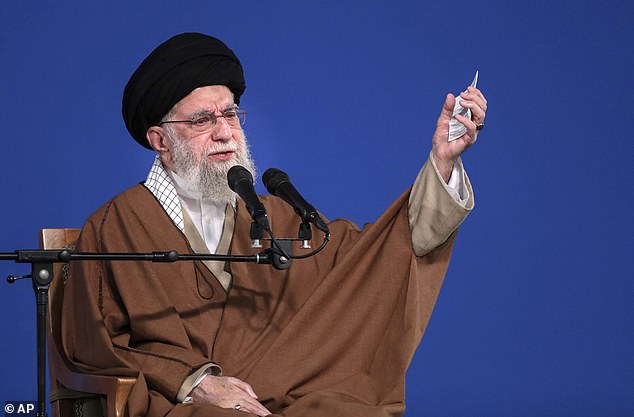
What will he do now his back’s against the wall? Iran’s Supreme Leader Ayatollah Ali Khamenei, 86, could make a dangerous mistake
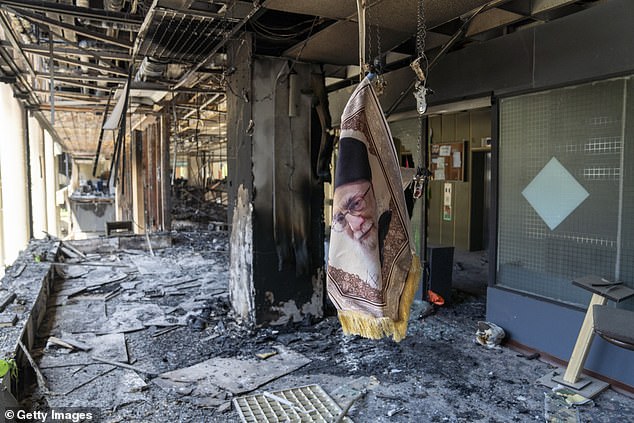
Scenes from the Iranian Broadcasting Organisation after an Israeli airstrike show how badly the regime is being crippled
‘Their best options may not produce the dramatic imagery of ballistic missile strikes, but they can still cause a lot of physical, psychological and economic damage.’
The Daily Mail takes a look at the terrifying steps Iran’s clerics may take now their backs are up against the wall…
FISSILE FURY
Israel launched its air campaign on June 12 warning that Iran had enough enriched uranium to produce nine or ten nuclear weapons. The American strikes now throw the future of the Iranian nuclear program into uncertainly.
The Islamic Republic has never carried out a test nuclear blast. But the atomic scientists who have been spared Israel’s assassination strikes so far could well repurpose fissile material for another type of weapon.
Former Pentagon official Michael Rubin, now at the American Enterprise Institute think tank, warns that Iran’s clerics could turn to a so-called ‘dirty bomb’ to settle scores with Israel and other enemies.
‘If Khamenei wants to make good on his threats, his next step will likely be to hit Israel with dirty bombs to spread radiation over large sections of its urban areas,’ says Rubin.
A dirty bomb, or radiological dispersal device (RDD), does not create a nuclear explosion, but spreads radioactive material using conventional explosives. Such a device could contaminate city centers, cripple emergency services, and trigger mass panic in such cities as Tel Aviv and New York.
TERROR PROXIES
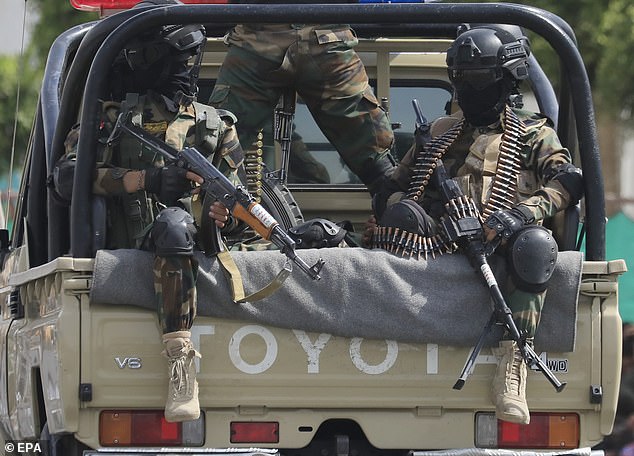
Iran-aligned Houthi fighters in Yemen are among the groups that could take actionin support of embattled Iran
Faced with regime collapse, Iran could turn to its weakened proxies — Hezbollah in Lebanon, Hamas in Gaza, Iraqi Shiite groups, and the Houthis in Yemen — to coordinate retaliatory attacks on Israel and the West, analysts warn.
Hamas and Hezbollah are on the back foot after Israeli attacks, but they could attack US targets in the Middle East or western cities to orchestrate attacks on civilians or infrastructure there.
Former FBI boss Chris Swecker ominously told the Daily Mail that a sleeper cell of such militants may already have snuck into America in the ‘open borders’ of the Biden era to carry out a terror hit on a US city.
‘What terrorist organization would not take advantage of that access to this country without having to go through airports and any type of screening whatsoever, and not be here in a sleeper capacity?’ said Swecker, an assistant FBI director in the 2000s.
‘If they’re not doing it, they’re a pretty poor terrorist organization.’
A Hamas or Hezbollah cell may not be able to recreate as complicated an attack as 9/11, given the greater security at airports and other targets nowadays, says Swecker, but a strike could still be catastrophic.
‘They were motivated enough to put together 9/11. Granted, we haven’t had anything like that since, but I can see a two- or three-person cell activating here in this country. And we know what kind of damage they could cause, just with shoulder weapons and IEDs.’
Swecker’s description recalls the November 2015 terrorist attack on Paris, when Islamist gunmen and suicide bombers attacked crowds at a football match, shops, and the Bataclan theater, killing 130 and injuring hundreds more.
TANKER WAR REDUX
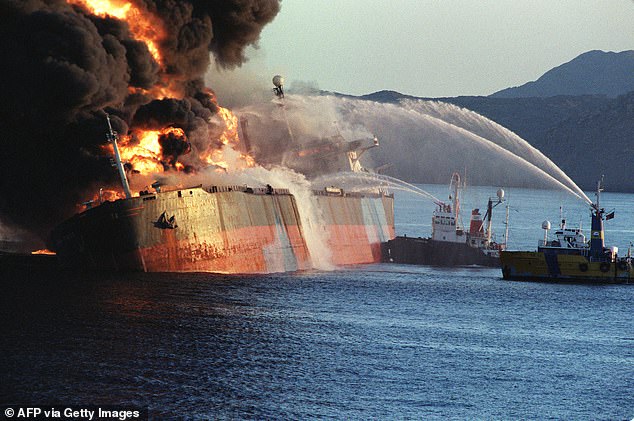
An oil tanker attacked by Iran near the Strait of Hormuz in 1987 during the so-called ‘Tanker War’ that sent crude prices soaring
Iran could shut the Strait of Hormuz as a way to lash out at its enemies, Behnam Saeedi, a member of the parliament’s National Security Committee presidium, warned on Thursday, as Israeli attacks intensified.
Tehran has in the past threatened to close the 21-mile-wide Strait to ships in retaliation for Western pressure. Shipping sources said this week that commercial vessels were avoiding Iran’s waters around the strait.
‘Closing the Strait of Hormuz is one of the potential options for Iran’ to ‘respond to its enemies,’ Saeedi said.
The Strait lies between Oman and Iran and is the main export route for Gulf producers such as Saudi Arabia, the United Arab Emirates, Iraq, and Kuwait. It accounts for a fifth of global daily oil consumption — some 18 million barrels
Closing it would spike the price of oil and trigger inflation and even a recession and geopolitical instability globally, recalling the market turmoil from the ‘Tanker War’ phase of the Iran-Iraq War in the 1980s.
The UAE, Saudi and other Gulf countries are meanwhile worried about Iranian strikes on their infrastructure, and lack anything as comprehensive as the ‘Iron Dome’ missile defense shield that protects Israel.
THE LONG ARM OF THE FATWA

Author Salman Rusdie was attacked at an event in upstate New York 43 years after a fatwa was issued against him. He survived but was left bline in one eye
Iran’s then-Supreme Leader Ayatollah Khomeini issued a fatwa, or religious edict, calling for the death of Salman Rushdie in 1989, saying his novel, The Satanic Verses, was blasphemous.
Rushdie lived for years with heightened security, but could not evade the long reach of that fatwa. In August 2022, he was repeatedly stabbed by a Muslim avenger in upstate New York. He survived, but was left blind in one eye.
The Islamic Republic’s clerics have issued hundreds of fatwas since they won power in a 1979 revolution, covering everything from medical ethics to fiscal policy. There’s even a fatwa against building nuclear weapons.
Khamenei has in the past issued religious rulings for Muslims to mobilize against Israel. There’s talk among Shiite clerics of more. A fatwa against Israeli Prime Minister Benjamin Netanyahu or even Trump is not impossible.
If writer Rushdie’s experience is anything to go by, anyone subject to a death sentence fatwa would be wise to keep their security detail for decades afterward.
CYBER ARMAGEDDON
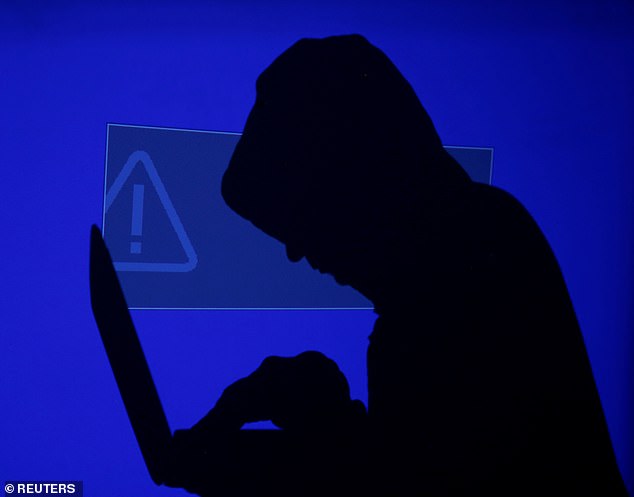
Tehran’s hacking gangs have boosted attacks on Israeli systems by 700 percent since fighting began
Iran’s cyber army — one of the most advanced outside NATO and China — has launched coordinated attacks on Israeli infrastructure in the past. A full-blown digital assault could cripple power grids, financial systems, and water supplies in target nations, analysts warn.
Tehran’s hacking gangs have upped their ‘malicious network activity targeting Israeli infrastructure’ sevenfold since the start of attacks on June 12, according to the cybersecurity firm Radware.
With Trump weighing whether to get involved, US-based agriculture and technology firms have urged US firms to ramp up their defenses ahead of a rush of cyberattacks from Iran.
Cristol, the author of The US and the Taliban before and after 9/11, says he’d be loath to take his children on the New York City subway, for fear of a reprisal Iranian attack if the US joins the air campaign.
‘My greatest concern is a wave of crippling cyberattacks against financial markets, energy infrastructure, and even against electrical grids and dam controls,’ he said.
‘This possibility is likely already causing economic damage as countries and companies move to reinforce their cyberdefenses and prepare contingency plans.’












